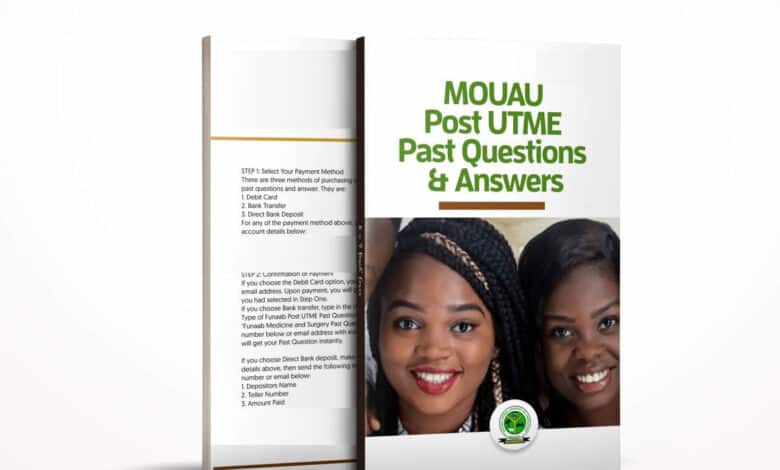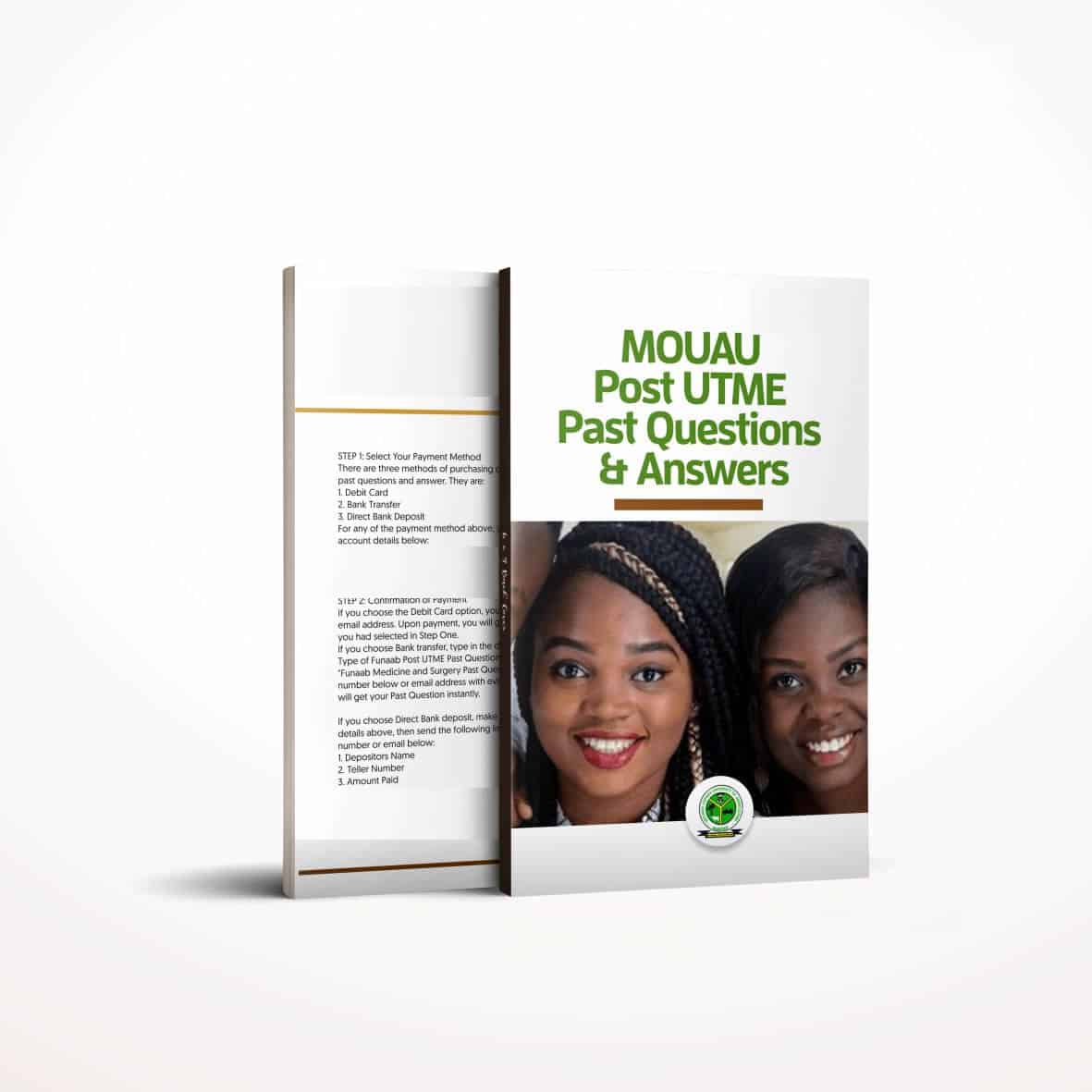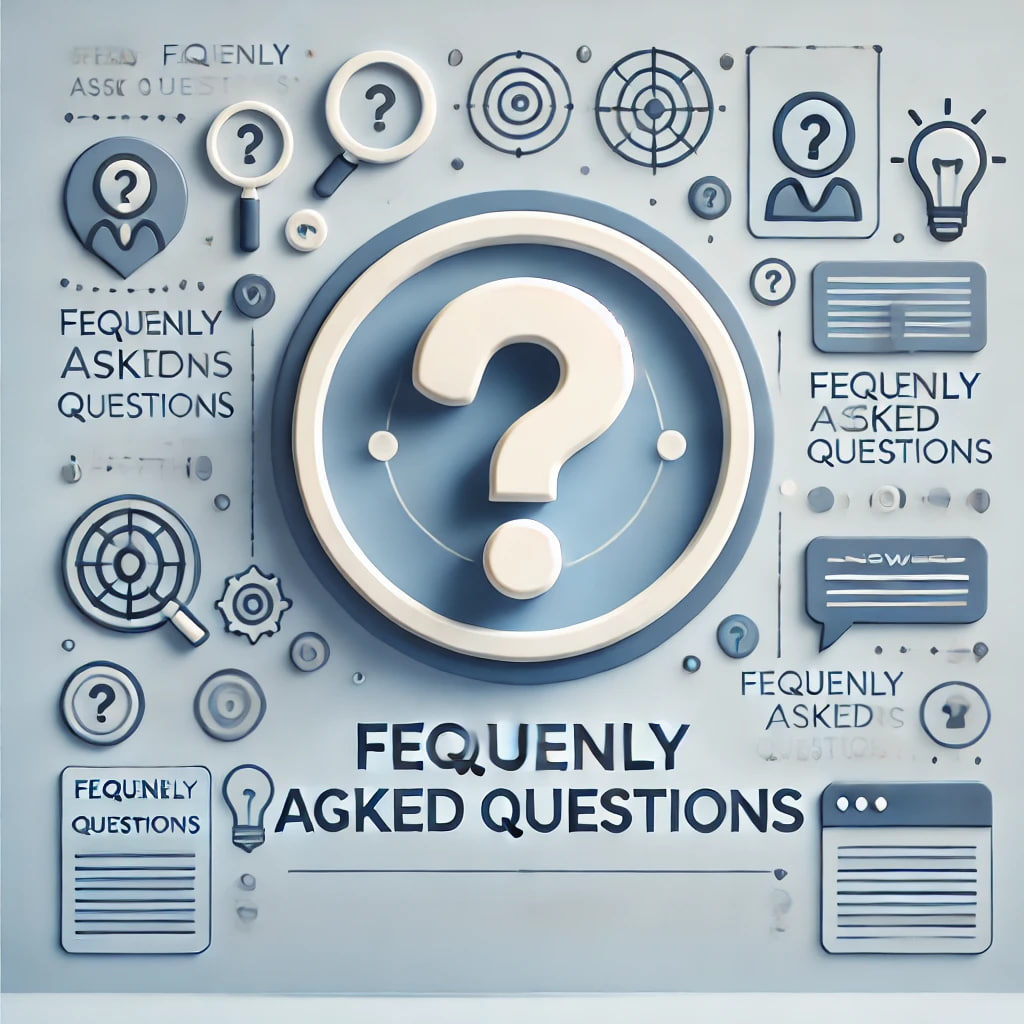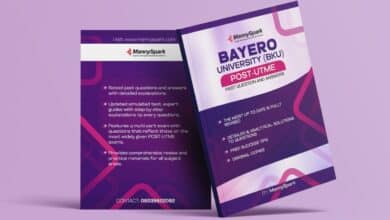
MOUAU Post UTME Past Questions And Answers PDF
Keep in mind that the Post UTME exam is a crucial turning point in your academic career as you go out on this important path. It’s a chance to demonstrate your expertise, abilities, and willpower. You can overcome obstacles and accomplish your objectives if you have the correct attitude and are well-prepared.
Comprehending the Post-UTME Examination Universities use the Post UTME exam as a screening tool to determine whether applicants are qualified for admission. Usually, it consists of multiple-choice questions that assess your understanding of pertinent topics. To succeed, you must become familiar with the structure, subject matter, and timing of the exam.
Principal Advantages of Planning
1. Increases Confidence: Being well-prepared makes you feel more assured and in command.
2. Enhances Time Management: You can finish the test in the allocated amount of time if you practise effective time management.
3. Improves Knowledge: Being prepared aids in the retention and recall of important ideas and details.
4. Reduces Anxiety: Stress and anxiety are lessened when one is familiar with the format and subject matter of the exam.
Strategies for Effective Preparation
1. Make a Study Plan: Make a well-organised study schedule that addresses all pertinent subjects and themes.
2. Practice with Past Questions: Use previous exam questions to get a feel for the structure and subject matter of the test.
3. Pay Attention to Weak Areas: Determine your areas of weakness and concentrate on strengthening them.
4. Remain Consistent: Regular study sessions and material reviews are essential.

Extra Advice
1. Remain Calm and Focused: Control your stress levels and maintain your attention throughout the examination.
2. Read Carefully: Pay close attention to each question and make sure you understand it.
3. Time Management: Use your time wisely to finish the test in the allocated amount of time.
Your Road to Achievement
You may accomplish your objectives and get accepted into the university of your choice with commitment, perseverance, and the correct direction.
Maintain your drive, concentration, and self-belief. You’re capable!
ABOUT MOUAU
Through Decree No. 48 of November 2, 1992, the Federal Government of Nigeria created the Michael Okpara University of Agriculture Umudike (MOUAU), formerly known as the Federal University of Agriculture, Umudike, as a specialised university. On May 27, 1993, Professor Placid C. Njoku was appointed as the first Vice-Chancellor and Council member, marking the start of official operations. Other important university officials were also appointed.
Situated approximately 9 kilometres from Umuahia town, the capital of Abia State, the institution is part of the well-known Agricultural Training and Research town of Umudike. The Umuahia – Ikot Ekpene Federal Road, which provides a direct route to the state capitals of Abia, Akwa – Ibom, and Cross River, is the main link road to the university. Due to its proximity to Umuahia, the university is connected to most regions of the nation via a major North-South Express Road. The University started its operations at the former Federal College of Agriculture, Umudike (now the Federal College of Agriculture has been moved to Ishiagu, Ebonyi state).
MOUAU officially began operations on May 3, 1993, when its first students were accepted. During the institution’s founding, there were only eighty-two (82) students enrolled in different lines of study. This number greatly differs from the most recent statistics, which indicate that there are approximately 27,750 undergraduate students, 4,598 postgraduate students, and 6,730 part-time students enrolled at the Continuing Education Centre (CEC). There are now about thirty-nine thousand and seventy-eight (30,078) students enrolled at Michael Okpara University of Agriculture, Umudike.
The university consists of two schools, sixteen directorates, fifty departments, and roughly eleven colleges. In order to attain sustainable food production, Michael Okpara University of Agriculture Umudike aspires to be a university of distinction and to assist the people of Nigeria and beyond by offering useful knowledge for agricultural transformation.
Currently, Professor Maduebibisi Ofo Iwe serves as our vice-chancellor. As the sixth substantive vice-chancellor of the university, he succeeded the late Prof. Francis Ogbonnaya Otunta and is a distinguished professor in the Department of Food Science and Technology (FST). In addition, he was the university’s previous Deputy Vice-Chancellor (Academics) and a Professor of Food Science Technology. On Tuesday, March 1, 2021, he took office.
IMPORTANCE OF PAST QUESTIONS AND ANSWERS
Because they offer insight into the exam’s format, question kinds, and necessary level of knowledge, previous questions and answers are essential for exam achievement. They assist students in comprehending the language and style of questions, the particular requirements of each topic, and how to provide succinct and precise answers. Furthermore, by going over previous questions, students can find often asked questions and practise responding to them, which eventually improves exam performance.
A more thorough explanation of the significance is provided below:
Understanding Exam Structure and Question styles: Students can gain a comprehensive understanding of the format, question styles, and topics covered in the exam by reviewing previous papers. This aids students in better time management and preparation for the test itself.
Understanding of Exam Language and Style: Students are exposed to the language and format of exam questions through previous questions. They improve their comprehension and responses by learning how to comprehend instructions, how to look for keywords, and how to phrase enquiries.
Finding Frequently Asked Topics: Patterns and recurrent themes can be found in previous enquiries. Students can prioritise their studies by examining them and concentrating on subjects that are more likely to come up in the test.
Answering Practice: Students can practice responding to various question kinds by working through previous questions. They can learn how to write succinctly, arrange their ideas, and structure their responses—all of which help them provide correct and effective responses.
Enhancing Time Management: Students can gauge how long it takes them to complete each question by going over previous papers. This aids students in creating a time management plan for the test, guaranteeing they can cover all the crucial areas.
Increasing Confidence and Reducing Exam Anxiety: Students who work through previous questions feel more prepared and familiar, which might help them feel less anxious and more confident before the test.
Finding Knowledge Gaps: Students can determine where their knowledge is lacking by contrasting their responses with the right answers. This enables students to concentrate on fortifying those domains and enhancing their comprehension in general.
📚How to Get the Updated PDF Past Questions🎯
To get the full past questions and answers, follow these steps:
Make a payment of ₦2,000
Send proof of payment via WhatsApp Receive the PDF file instantly
Payment Method:
- Bank Transfer (Account details available upon request)
- Mobile Payment (Via bank apps or USSD)
💻 Quick Purchase Link
CLICK HERE TO BUY MOUAU Post UTME QUESTIONS AND ANSWERS
“Success in your exam starts with the right preparation. Don’t miss this opportunity!”
FORMAT USED IN MOUAU POST UTME EXAMINATION
Multiple-choice questions are commonly used in the Michael Okpara University of Agriculture, Umudike (MOUAU) Post-UTME exam. In addition to filling up an online application, candidates might also need to upload their WAEC, NECO, or NABTEB results to the MOUAU portal, along with any other necessary paperwork. The actual test is typically a computer-based assessment (CBT).
Here’s a more thorough explanation:
Online Application Form: According to mouau.edu.ng, candidates must fill out an online application form with information such as their O’Level results, email address, phone number, and JAMB registration number.
Multiple-Choice Questions: The Post-UTME test includes multiple-choice questions that gauge applicants’ familiarity with the topics related to their selected field of study.
Computer-Based Test (CBT): To facilitate effective scoring and evaluation, the test is usually administered in a CBT format.
O’Level Result Upload: According to portal.mouau.edu.ng, candidates must upload their O’Level (WAEC/NECO/NABTEB) results to the MOUAU platform, verifying that the information is accurate.
Required Qualifying Certificate: When completing the screening form, candidates can also be required to attach their original qualifying certificate in PDF format.
JAMB CAPS: Applicants must make sure that their O’Level results are added to their profile.
Details of the Scratch Card: During the application procedure, the PIN and serial number of the scratch card are also needed.
STRUCTURES USED IN MOUAU POST UTME EXAMINATION
Assessing a candidate’s fit for their chosen program and making sure they match the academic requirements of the university are the main goals of the frameworks employed in the Michael Okpara University of Agriculture (MOUAU) Post UTME test. These frameworks demand the uploading of necessary papers in addition to online registration and screening. Candidates must specifically complete an online application, choose their desired department, and include their O’Level scores (WAEC, NECO, or NABTEB). Additionally, they have to upload their results to the MOUAU platform and their JAMB profile. Candidates for direct entry must also upload their qualifying credentials and O’Level results.
FREQUENTLY ASKED QUESTIONS

Does a WAEC scratch card have to be present? According to the university website, it is necessary to confirm your findings.
Is the post-screening exam only verification or is it written? According to the College of Crop and Soil Sciences website, the post-screening test includes both possible written assessments and results verification.
Can someone who has an awaiting O’Level result (such as WAEC) apply for post-screening?
You can apply using your pending O’Level results, yes.
What would happen if, although MOUAU was my first pick on JAMB, it wasn’t on the printout of my results?
The FAQ section states that you must return to the MOUAU portal in order to begin the admission application process anew.
Is it possible to register for the post-screening online?
Online registration is available, however it’s crucial to follow the right process and verify the information on the university’s website (mouau.edu.ng).
How can my O-Level results be uploaded?
According to the university website, you must upload your O’Level results (WAEC/NECO/NABTEB) to the MOUAU platform after making sure the information is accurate.
Where can my O-Level results be uploaded to JAMB CAPS?
At a JAMB CBT-accredited centre, you must upload your O’Level results to JAMB CAPS.
Where can I find the PDF versions of previous questions and answers?
The greatest source to find year-to-year questions and answers is Manny Spark. We provide 100% correct, thorough, and complete past questions and answers to help you comprehend and study efficiently, and it’s reasonably priced—just 3,000 naira.
📚How to Get the Updated PDF Past Questions🎯
To get the full past questions and answers, follow these steps:
Make a payment of ₦2,000
Send proof of payment via WhatsApp Receive the PDF file instantly
Payment Method:
- Bank Transfer (Account details available upon request)
- Mobile Payment (Via bank apps or USSD)





These past questions are gold! Manny Spark really knows what students need. If you’re preparing for the School of Nursing exam, don’t think twice — get your copy!